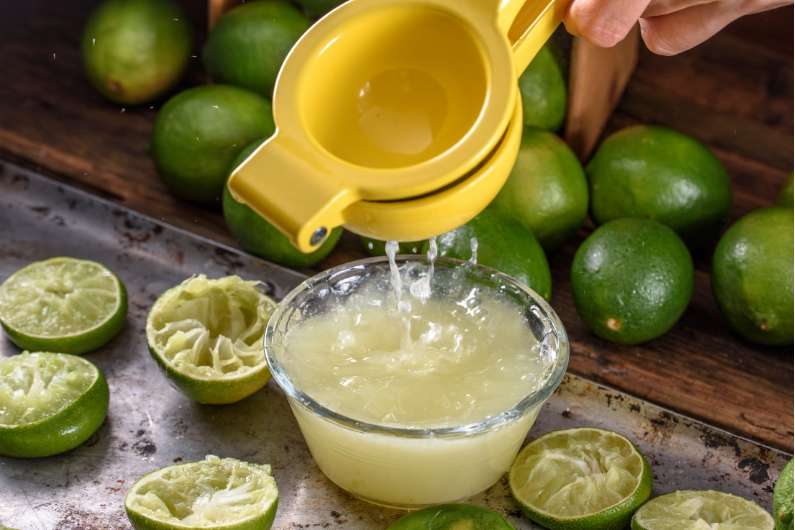Fresh lime juice lasts for 3–4 days when refrigerated. Adding a pop of bright and refreshing flavor to drinks and dishes is effortless with fresh lime juice.
However, not everyone knows the answer to the question of how long does fresh lime juice last. It’s often frustrating to get halfway through a recipe only to realize the lime juice has gone bad. Whether you have made an entire pitcher of margaritas or a salad dressing, it’s essential to know how to store lime juice properly and for how long it can be kept in the fridge.
Understanding how to keep fresh lime juice at its optimal freshness can guarantee a flavorful and perfect squeeze every time.
Why Is It Important To Know The Shelf Life Of Fresh Lime Juice?
Fresh lime juice is a popular ingredient in cooking, mixology, and health drinks. Knowing its shelf life is crucial, as consuming spoiled juice may result in health issues.
Hence, this article aims to discuss the importance of knowing the shelf life of fresh lime juice, and how it can benefit home cooks, bartenders, chefs, restaurant owners, and health enthusiasts.
So, let’s dive in!
For Home Cooks
- Lime juice adds a refreshing tanginess to many dishes, and it’s tempting to buy in bulk. However, it’s crucial to know the shelf life to prevent food poisoning.
- The shelf life of fresh lime juice is seven days when stored in a sealed container, and up to six months in the freezer.
- Home cooks can reduce waste and ensure the quality of their food by using lime juice within its shelf life.
For Bartenders
- Lime juice is a staple in many cocktails, from margaritas to gimlets.
- Customers expect their cocktails to be fresh and high-quality, and using spoiled lime juice can ruin the taste and potentially make them ill.
- Knowing the shelf life of lime juice can help bartenders maintain the quality of their drinks and prevent any health hazards.
For Chefs
- Many savory dishes, such as ceviche and guacamole, rely on lime juice to provide acidity and elevate their flavor.
- Chefs can plan their recipes and avoid using expired lime juice by knowing its maximum shelf life.
- Lime juice that’s past its expiration point can also ruin dressings, marinades, and sauces.
For Restaurant Owners
- The success of a restaurant depends on the quality of its food and the satisfaction of its customers.
- Knowing the shelf life of lime juice and implementing proper storage techniques, such as refrigeration, can prevent food spoilage and illness.
- Restaurant owners can save money by reducing waste, as they can avoid throwing away expired lime juice that’s no longer suitable for use.
For Health Enthusiasts
- Lime juice is a rich source of vitamin C and other antioxidants that promote better health.
- However, consuming expired juice can have adverse effects on the body, such as bacterial infections and food poisoning.
- Health enthusiasts can ensure that they are getting the most out of their lime juice by using it within the recommended shelf life.
Knowing the shelf life of fresh lime juice is crucial for everyone who uses it. By taking precautions to prevent spoilage, such as proper storage and adhering to shelf life guidelines, home cooks, bartenders, chefs, restaurant owners, and health enthusiasts can ensure that they are using the freshest and highest quality lime juice in their recipes and drinks.
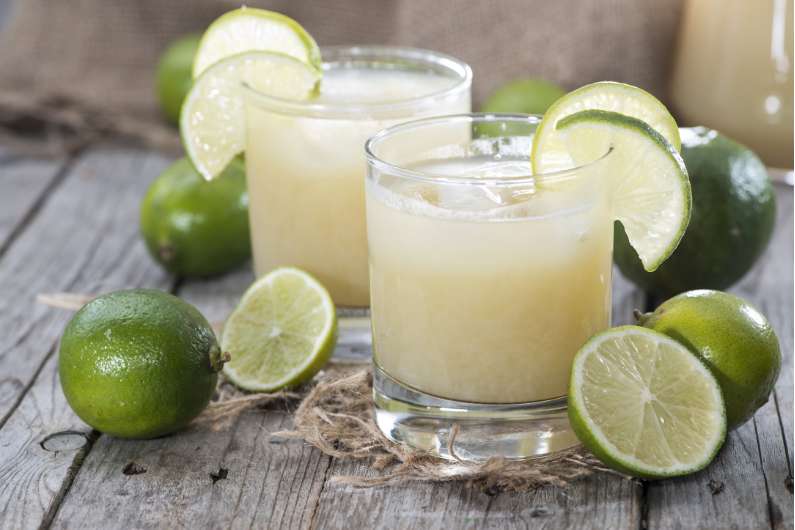
Factors Affecting The Shelf Life Of Fresh Lime Juice
Many of us love the tangy, refreshing taste of fresh lime juice, whether it’s added to our favorite cocktail or squeezed over fish tacos. However, if you’ve ever wondered how long fresh lime juice lasts, it’s important to understand the factors that can affect its shelf life.
Oxygen Exposure
Lime juice can oxidize and lose its freshness when exposed to air or oxygen. Once the lime juice comes into contact with oxygen, it begins to break down, leading to a shorter shelf life.
To avoid oxidization, try squeezing lime juice only when you need it. Alternatively, cover the lime juice with plastic wrap, pressing it directly onto the surface of the juice. This will limit the amount of air contact and slow down oxidation for a longer shelf life.
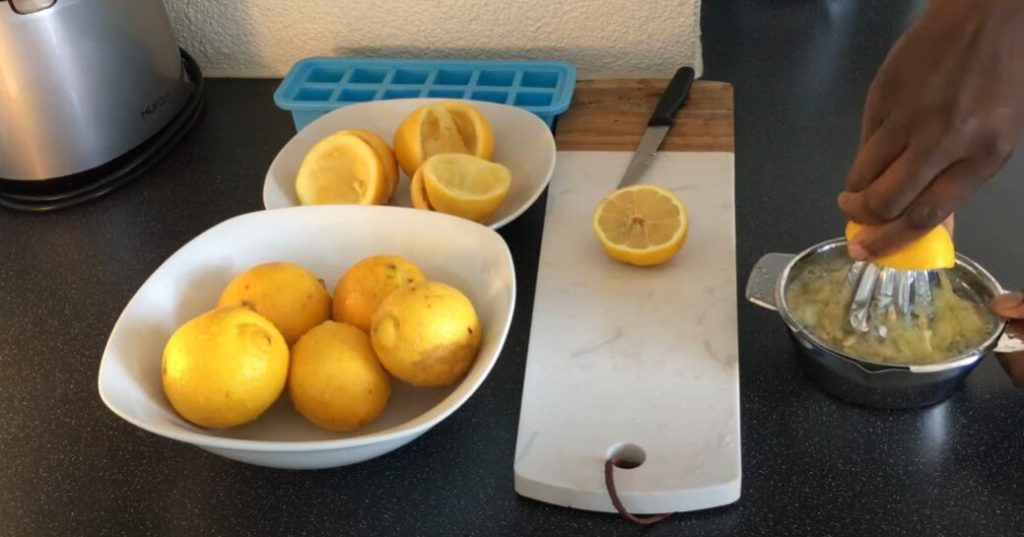
Temperature
Temperature is a vital factor when it comes to the freshness of lime juice. The enzymes in lime juice can be inactivated if frozen or stored at low temperatures for too long. At the same time, if fresh lime juice is left at room temperature for too long, bacteria growth can occur, leading to spoilage.
Lime juice should be stored in the refrigerator at all times. The ideal temperature range should be between 35°f to 40°f (2°c to 4°c). If you’re not sure whether the lime juice has been kept at the correct temperature, its appearance, smell, and taste can be a telltale sign of spoilage.
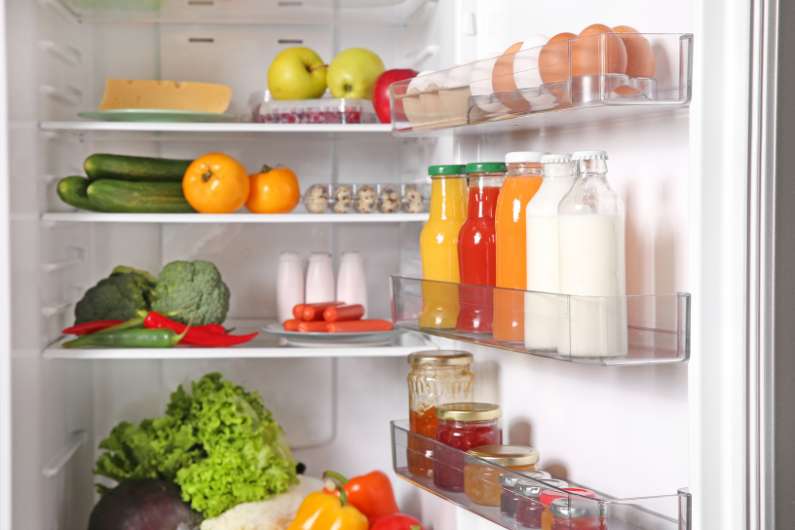
Acid Content
Lime juice has a high acid content that can slow down the spoilage process. The acid content helps to create an environment that is hostile to bacteria growth, thus extending the life of the lime juice.
To get the best shelf life from your lime juice, use fresh lime juice from ripe fruits and store it in an airtight container. You can also add a small amount of sugar or salt to balance the taste and further extend its shelf life.
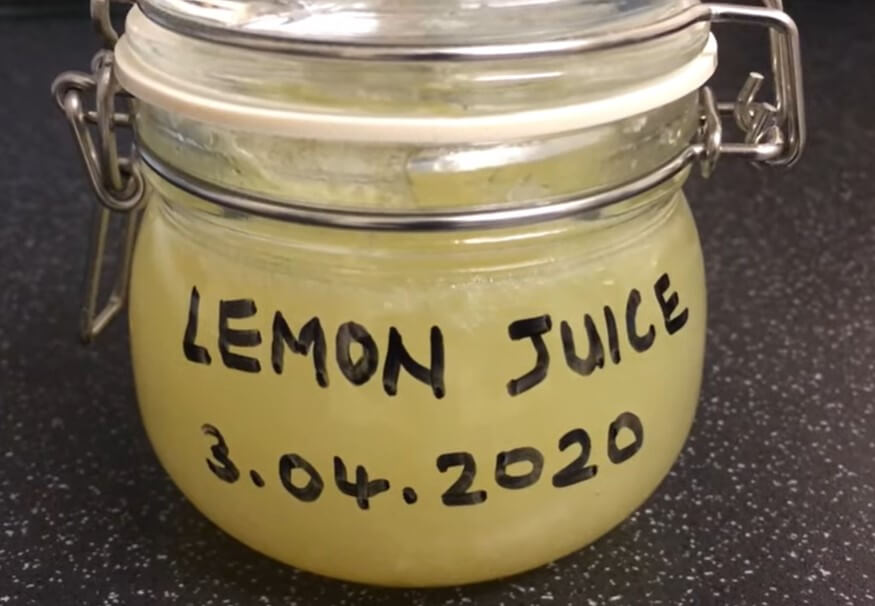
Container Material
The type of container that you use to store your lime juice can have a significant impact on its shelf life. The key here is to choose a container that is non-reactive and airtight to prevent air or bacteria contamination.
When selecting a container for your fresh lime juice, opt for those made of glass or plastic that do not react with the acidity in the lime juice. The container should also have an airtight seal to limit the amount of air contact.
Overall, fresh lime juice is a delicious and healthy addition to many recipes. By understanding the factors that affect its shelf life, you can enjoy it for longer and avoid unnecessary waste.
Proper Storage
Fresh lime juice can be a versatile ingredient for many dishes, drinks, and sauces. However, it can become unusable quickly if not appropriately stored. Below are some tips for extending the shelf life of fresh lime juice.
Proper Refrigeration
Fresh lime juice is highly perishable and requires proper refrigeration to extend its shelf life.
Here are some tips for refrigerating fresh lime juice correctly:
- Store fresh lime juice in a clean, airtight container.
- Keep the container in the refrigerator, at a temperature below 40°f (4°c) at all times.
- Do not store fresh lime juice in the refrigerator door, as it exposes the juice to temperature changes every time the door opens and closes.
- Always check the freshness and quality of the lime juice before using it.
Freezing Fresh Lime Juice
Freezing fresh lime juice can be an effective way to extend its shelf life.
Here are some tips for freezing fresh lime juice:
- Use an airtight container to freeze fresh lime juice.
- Leave some headspace in the container to allow for expansion during the freezing process.
- Label the container with the date so that you can keep track of how long it has been in the freezer.
- Frozen fresh lime juice is safe to use for up to six months.
Tips For Keeping Fresh Lime Juice Fresh
To ensure that fresh lime juice stays fresh, try these tips:
- Always use fresh limes to make the juice.
- Use a clean cutting board and knife to prevent contamination.
- Immediately refrigerate fresh lime juice after squeezing.
- Avoid leaving fresh lime juice at room temperature for more than two hours.
By following these tips, you can keep fresh lime juice usable for a more extended period. Proper refrigeration and freezing are essential for ensuring that fresh lime juice doesn’t spoil too soon.
How Does Exposure To Air Affects The Shelf Life Of Fresh Lime Juice?
The zesty and tangy flavor of fresh lime juice can add an extra dimension to any dish or beverage. Lime juice is also a great source of antioxidants and vitamin C. However, if you’re wondering how long fresh lime juice lasts, you need to consider factors like exposure to air.
Quick Oxidation And Its Effects On Fresh Lime Juice
When you cut the lime, its juice comes into contact with oxygen in the air. This quickens the oxidation process, leading to its deterioration. Air exposure plays a significant role in reducing the shelf life of fresh lime juice.
Here are some key points to consider:
- Exposure to air leads to the rapid loss of flavor, aroma, and nutritional value.
- The natural acids and enzymes in lime juice break down when exposed to the air, causing the juice to become less acidic and reduce the tangy flavor.
- Fresh lime juice usually becomes cloudy once exposed to air for extended periods.
- The longer fresh lime juice is left exposed to air, the fewer antioxidants and vitamin C it contains.
- Uncovered lime juice can absorb odors from other foods in the fridge, making it less pleasant.
Tips For Storing Fresh Lime Juice
To prolong the shelf life of fresh lime juice, it’s essential to store it in airtight containers.
Here are some tips to help keep your lime juice fresh and delicious:
- Store lime juice in glass or plastic bottles or jars with tight-fitting lids.
- Avoid keeping lime juice in metal containers, as the acid can make it taste metallic.
- Keep lime juice in the refrigerator, not on the counter or in a warm area.
- If you plan on storing lime juice for an extended period, consider freezing it for up to six months.
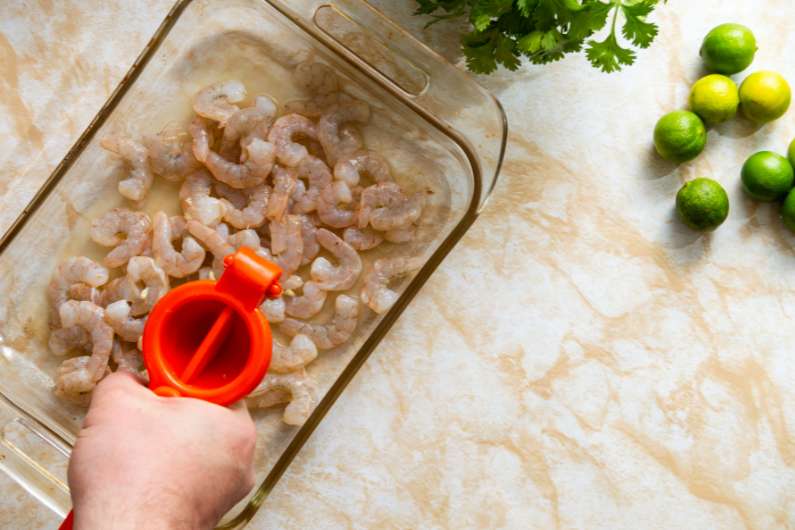
By following these tips, you can extend the shelf life of your fresh lime juice and ensure that it remains zesty, tangy, and full of flavor.
How Does Contamination Affect The Shelf Life Of Fresh Lime Juice?
Fresh lime juice is a delightful addition to any recipe, from cocktails to marinades. However, if not stored or handled correctly, it can expire quickly. One of the main factors that can influence the shelf life of fresh lime juice is contamination.
Here, we will discuss how contamination affects the shelf life of fresh lime juice and how to avoid it.
Contamination can significantly impact the shelf life of fresh lime juice. It occurs when harmful microorganisms enter the juice, infectious agents, or pathogens that can cause illnesses. Factors that can lead to contamination include unclean cutting boards, knives, and hands used to prepare the lime.
Additionally, improper storage can result in contamination as well.
- Contamination in fresh lime juice reduces its shelf life.
- Harmful microorganisms can enter fresh lime juice.
- Unclean knives, cutting boards, and hands can lead to contamination.
- Improper storage can result in contamination and spoilage.
How To Avoid Contamination
The good news is that there are several ways to avoid contamination with fresh lime juice, significantly extending its shelf life. First and foremost, hygiene is the most critical factor in reducing contamination. Ensuring that the cutting board, knives, and hands are clean and sanitized is essential.
Additionally, storing fresh lime juice properly, either refrigerating or freezing it, can help prevent contamination.
- Hygiene is the most crucial factor in reducing contamination.
- Sanitizing cutting boards, knives, and hands is essential.
- Proper storage of fresh lime juice can help prevent contamination.
- Refrigerating and freezing can help extend the shelf life of fresh lime juice.
Understanding how contamination affects the shelf life of fresh lime juice and taking the necessary precautions can help you enjoy it for an extended period of time. By following the tips mentioned above and practicing good hygiene, you can avoid contamination and ensure your fresh lime juice tastes great for weeks.
How Temperature Affects The Shelf Life Of Fresh Lime Juice?
Lime juice is highly perishable, and its shelf life depends on several factors. The temperature at which you keep your freshly made lime juice is an important factor that affects its shelf life.
When it comes to temperature, the main concern is the growth of bacteria in the juice.
Here are some key points to consider:
- The ideal temperature range for storing fresh lime juice is between 32°F and 40°F (0°C to 4°C). This temperature range slows down the growth of bacteria and keeps the juice fresh for longer.
- If you store fresh lime juice at room temperature (68°F to 72°F or 20°C to 22°C), it will start to spoil quickly. Bacteria can double in number every 20 minutes at room temperature, which means that the juice can become unsafe to consume in just a few hours.
- If you need to store fresh lime juice at room temperature, make sure to consume it within 2 hours. After 2 hours, transfer the juice to the refrigerator to extend its shelf life.
- If you want to preserve fresh lime juice for longer, you can freeze it. Lime juice can be frozen for up to 6 months. However, freezing may affect the texture and taste of the juice.
- When thawing frozen lime juice, place it in the refrigerator to defrost slowly. Avoid thawing it at room temperature or in the microwave, as this can lead to the growth of bacteria.
Managing the temperature of fresh lime juice is crucial to ensuring its safety and freshness.
By following these tips, you can enjoy your lime juice without worrying about its shelf life.
Best Practices For Extending The Shelf Life Of Fresh Lime Juice.
Lime juice is a versatile ingredient that adds a tangy flavor to drinks, salads, and numerous dishes. It is undoubtedly a staple for most households. However, fresh juice can develop bacteria over time, and it can be challenging to gauge how long it stays fresh.
We’ll explore the best practices for extending the shelf life of fresh lime juice.
Best Practices For Extending The Shelf Life
To keep your lime juice fresh for longer, you should:
- Store lime juice in an airtight glass container, as plastic can react with citrus juice, causing it to degrade and alter in flavor.
- Keep lime juice refrigerated, as it will last much longer at colder temperatures. The ideal temperature for storing lime juice is between 32°F to 40°F (0°C to 4°C).
- Do not leave lime juice exposed to air for extended periods, as it can easily spoil the juice.
- Add a pinch of salt to freshly squeezed lime juice to increase its shelf life. Salt acts as a natural preservative and inhibits bacterial growth.
- Freeze lime juice in ice cube trays for easy portion control and future use. Frozen lime juice cubes can last up to six months.
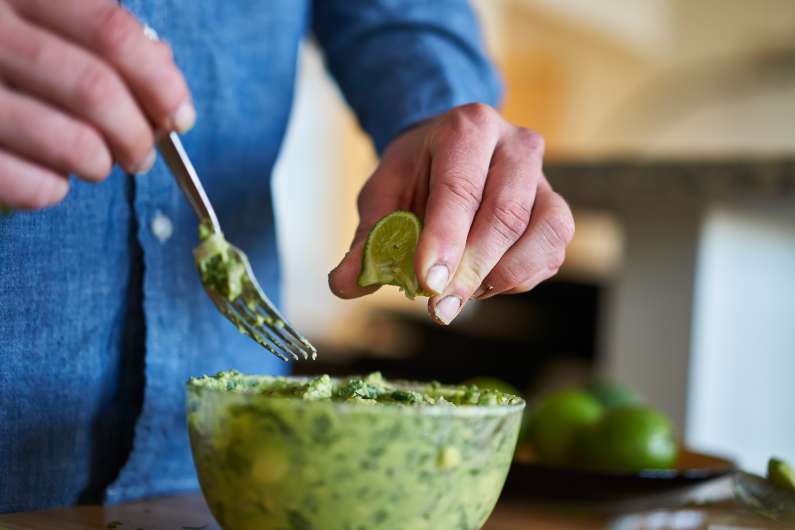
The Dangers Of Stale Lime Juice
If you are wondering whether stale lime juice is safe to consume, the simple answer is no. Stale lime juice can lead to foodborne illnesses and should be discarded. Signs of stale lime juice include changes in color and texture, a sour smell, and a tangy, unpleasant taste.
Alternative Ways To Store Lime Juice
Apart from the standard storage method in a glass container, there are alternative ways to store lime juice and increase its shelf life. These include:
- Adding lime juice to vinegar or other acidic liquids creates salad dressings and marinades that last longer.
- Canning or preserving lime juice is another way to extend its shelf life. The process involves pasteurizing the lime juice and storing it in an airtight container.
It is essential to follow best practices when storing fresh lime juice. Storing the juice in an airtight glass container in the fridge, adding salt, and freezing it in ice cube trays are some of the most effective methods for preserving it.
By following these guidelines, you can ensure that your lime juice stays fresh for a longer period of time and is safe to consume.
Can Preservatives Help Fresh Lime Juice Last Longer?
Preservatives are additives that can slow down or prevent the growth of bacteria, yeast, and mold in food products. The addition of preservatives can help extend the shelf life of fresh lime juice, ensuring it lasts longer while maintaining its freshness and nutritional value.
Here are a few ways to add preservatives to your fresh lime juice:
- Citric acid: Citric acid is a natural preservative that can help prevent the growth of bacteria. A small amount of citric acid can be added to fresh lime juice to extend its shelf life. This acid can be found easily in any grocery store or online.
- Sodium benzoate: Sodium benzoate is a common preservative found in many foods and beverages. It is an effective antimicrobial agent and can help prolong the shelf life of fresh lime juice. However, it can only be added to acidic foods like lime juice.
- Potassium sorbate: Potassium sorbate is another preservative that can help inhibit the growth of bacteria, mold, and yeast in fresh lime juice. It is added to foods such as cheese, dried fruits, and fruit juices to extend their shelf life.
- Ascorbic acid: Ascorbic acid, also known as vitamin C, is a natural antioxidant that can help prevent the oxidation of fresh lime juice, thereby increasing its shelf life. A small amount of ascorbic acid can be added to lime juice to help preserve its freshness.
- Natural preservatives: Some natural preservatives, such as honey, salt, and vinegar, can be added to fresh lime juice to help extend its shelf life. These natural preservatives can also enhance the flavor of the lime juice.
To ensure the safety and quality of your fresh lime juice, it is essential to maintain strict hygiene standards, use clean utensils and containers, and store the juice in airtight containers in the refrigerator.
By using these preservatives, you can enjoy fresh, tangy lime juice for a longer period of time, making it a valuable addition to your pantry.
Freezing Lime Juice: The Key To Extending Its Shelf Life
Lime juice is a versatile ingredient used in many recipes, but its shelf life is relatively short. Fortunately, you can extend its lifespan by freezing it. Here’s how:
The Process Of Freezing Lime Juice
To freeze lime juice successfully:
- Squeeze fresh lime juice into an ice cube tray.
- Cover the tray with plastic wrap and gently tap it on a flat surface to remove any air bubbles.
- Place it in the freezer until the cubes are frozen solid.
- Transfer the lime juice cubes into a freezer-safe bag and label it with the date.
- Store the bag in the freezer until it is ready to use.
Tips For Freezing Lime Juice
- To make the most out of frozen lime juice, it’s best to use it within six months.
- Consider adding a small amount of sugar or salt to the lime juice before freezing it, which can help to preserve its flavor and acidity.
- If you need only a small amount of lime juice, consider freezing it in an ice cube tray rather than a large volume.
By following these simple steps, you can freeze lime juice and keep it fresh for an extended period. Don’t let wasted lime juice be the reason for throwing away unused ingredients. Freeze them, and you’ll always have fresh lime juice at hand!
Fresh Lime Juice Vs Bottled Lime Juice
When it comes to cooking and drinks, lime juice plays a significant role in many recipes. Fresh lime juice and bottled lime juice are the two most commonly used types of lime juice.
However, deciding which one to use can be a tough call, so knowing the shelf life of these types of lime juice is essential.
Here’s what you need to know:
Compare The Shelf Life Of Fresh And Bottled Lime Juice.
Fresh Lime Juice
- Fresh lime juice has a short shelf life of about 2 to 3 days when stored in the refrigerator.
- To increase the shelf life of fresh lime juice, you can freeze it for up to six months, but be mindful that frozen lime juice differs in flavor from freshly squeezed lime juice.
- Fresh lime juice contains no preservatives and is typically less acidic than bottled lime juice.
Bottled Lime Juice
- Bottled lime juice, on the other hand, has a longer shelf life and can be stored for up to six months or more, regardless of whether it is opened or not in the refrigerator.
- Bottled lime juice comes with preservatives added to increase its shelf life and may sometimes contain artificial colors and flavorings in the ingredients.
- Because of the citric acid added to the bottle, bottled lime juice is more acidic when compared to fresh lime juice.
Both fresh lime juice and bottled lime juice have their advantages and disadvantages. For cooking recipes that call for freshly squeezed lime juice or to add to water, fresh lime juice is best due to its natural and refreshing taste.
Meanwhile, bottled lime juice is a great alternative when you don’t have fresh limes available, and its long shelf life means you can stock up on it without worry.
Remember to always read the labels when purchasing bottled lime juice and refrigerate the bottle after opening it. And if you prefer to use fresh lime juice, always opt for freshly squeezed lime juice that has no added preservatives, even if it means needing to squeeze a few extra limes.
FAQs On How Long Does Fresh Lime Juice Last
How Long Does Freshly Squeezed Lime Juice Last?
Freshly squeezed lime juice can last up to a week if stored in an airtight container in the refrigerator.
How Can I Tell If Lime Juice Has Gone Bad?
If your lime juice smells off or has a strange taste, it has probably gone bad and should not be consumed.
Can I Freeze Fresh Lime Juice?
Yes, you can freeze fresh lime juice for up to 6 months. Store it in an airtight container in the freezer.
Can Bottled Lime Juice Be Used As A Substitute For Fresh Lime Juice?
Bottled lime juice can be used as a substitute for fresh lime juice, but the taste may differ slightly. For best results, use fresh lime juice.
Conclusion
Based on our in-depth analysis, the shelf life of fresh lime juice depends on different factors such as storage conditions, packaging, and handling. Generally, fresh lime juice can last up to five days when refrigerated in an airtight container. However, it is always advisable to consume it within the first two days of squeezing to enjoy its peak flavor and nutritional value.
To maximize the shelf life of your lime juice, you can also freeze it into ice cubes and keep them in an airtight container in the freezer. This way, you can extend the shelf life up to six months. Remember to always use your senses to check for any off-odor or discoloration before consuming.
Investing in high-quality limes and proper storage of fresh lime juice can go a long way in ensuring that you enjoy it whenever you need it.

